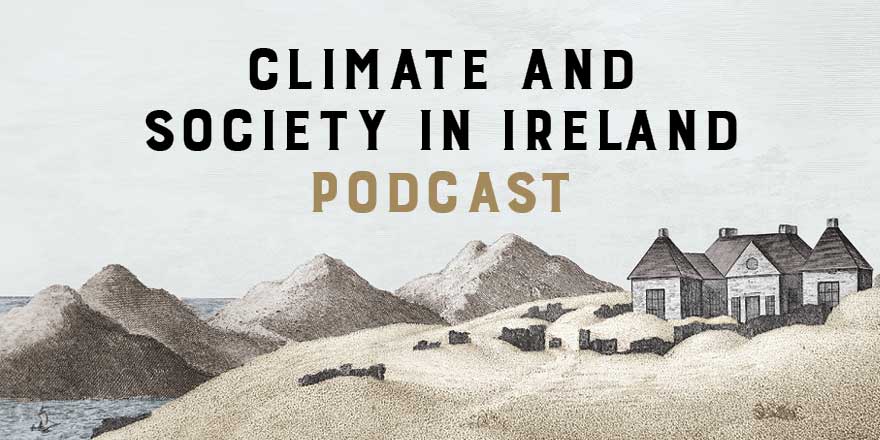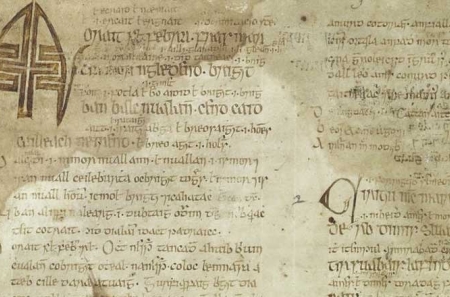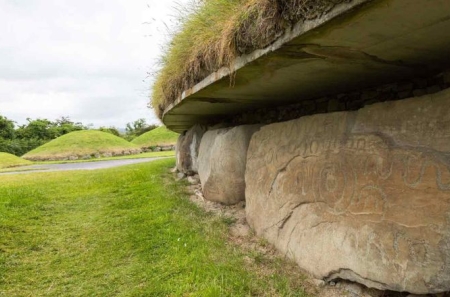
Climate and Society in Ireland podcast ep. 3: Bruce Campbell and Francis Ludlow
08 December 2021In episode 3, host Gill Plunkett talks to Bruce Campbell and Francis Ludlow about climate change as a major but neglected grand theme of late medieval Irish history.
In this new series of four podcasts host Gill Plunkett explores the long view of climate change by interviewing the authors of Climate and Society in Ireland. We talk about hunter gatherers, disease, poetry, weather events and consider our future vulnerabilities. In today's episode, Bruce Campbell (QUB) and Francis Ludlow (TCD) consider the effects that climate had on the lives and livelihoods of ordinary people in late medieval Ireland.
The Climate and Society in Ireland podcast goes live on Wednesday and episodes are available on SoundCloud, Spotify and Apple Podcasts.
Climate and Society in Ireland is also a blog series based on the book chapters. Find the full list of blogs here.
About the book
Climate and Society in Ireland is a collection of essays, commissioned by the Royal Irish Academy, that provides a multi-period, interdisciplinary perspective on one of the most important challenges currently facing humanity. Combining syntheses of existing knowledge with new insights and approaches, contributors explore the varied environmental, climatic and social changes that occurred in Ireland from early prehistory to the early 21st century. The essays in the volume engage with a diversity of pertinent themes, including the impact of climate change on the earliest human settlement of Ireland; weather-related food scarcities during medieval times that led to violence and plague outbreaks; changing representations of weather in poetry written in Ireland between 1600 and 1820; and how Ireland is now on the threshold of taking the radical steps necessary to shed its ‘climate laggard’ status and embark on the road to a post-carbon society. Purchase Climate and Society in Ireland.
About the speakers
Bruce Campbell is Emeritus Professor of Medieval Economic History at The Queen’s University of Belfast, where he has taught since 1973. During that time he has belonged to the Departments of Geography, Economic History, History, and, now, the School of Geography, Archaeology and Palaeoecology. His research currently focuses upon the economic history of late-medieval Britain and Ireland, with particular reference to human-environment interactions during the fourteenth century and trends in agricultural output and productivity from the thirteenth to nineteenth centuries. Of particular interest are the close coincidence of both the European cattle panzootic of 1316-25AD and the human pandemic of 1346-53AD with marked short-term climatic anomalies and a general increase in environmental instability.
Francis Ludlow is Assistant Professor of Medieval Environmental History, Trinity College Dublin (TCD), and co-founder of the Irish Environmental History Network (in 2009) and Trinity Centre for Environmental Humanities (in 2017). He is currently Principal Investigator of the IRC Laureate Award-funded project 'Climates of Conflict in Ancient Babylonia' (2018-2022) and Co-PI of the U.S. National Science Foundation-funded project 'Volcanism, Hydrology and Social Conflict: Lessons from Egypt & Mesopotamia' (2018-2022). He is Project Partner of the IRC COALESCE-funded project 'Irish Droughts: Environmental and Cultural Memories of a Neglected Hazard' (2019-2021), and the Swiss National Science Foundation-funded project 'Effects of Large Volcanic Eruptions on Climate and Societies' (2019-2023). He serves on the 'Volcanic Impacts on Climate and Society' working group Steering Committee (2015-Present), and as a 'Key Participant' (2018-Present) of the 'Climate Reconstruction and Impacts from the Archives of Societies' working group (both PAGES-funded). He also serves (2019-Present) on the Editorial Advisory Board of a new monograph series on Pre-Modern environmental history, produced by Oxford University Press in association with the Princeton Climate Change and History Research Initiative.
About the host
Dr Gill Plunkett is Reader in the School of Natural and Built Environment at Queen's University Belfast. Gill is an archaeologist and palaeoecologist with a specific interest in understanding human-environment interactions in the past. As an archaeologist, Gill has worked on Irish prehistoric and Medieval sites, and has several years experience of wetland archaeology survey and recording. Her palaeoecological expertise includes palynology and plant macrofossil analysis (peatland and archaeobotanical), as well as the application of tephrochronology as both a dating and correlation method and a means of examining volcanic impacts on climate and society. While much of her research is based on Irish bogs, her tephra work extends to polar ice cores, the Caspian Sea and lakes and bogs in North America, Kamchatka and southeast Asia.



